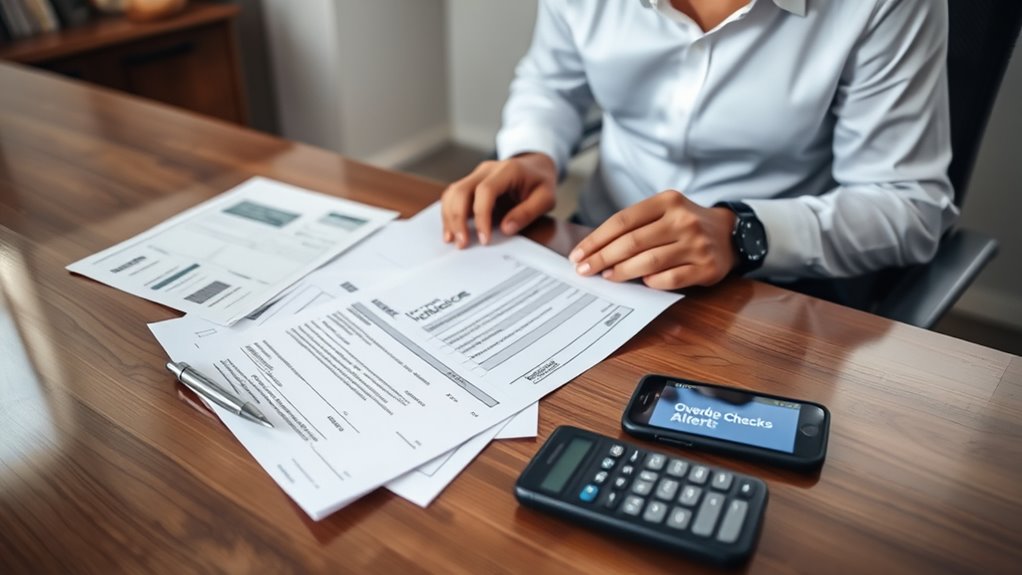When dealing with late payments or bounced checks, act promptly by contacting your customer politely to confirm the issue and send gentle reminders with payment details and potential consequences. Assess their credit risk and adjust your terms if needed. Keep detailed records of all communications and escalate collection efforts gradually, balancing assertiveness with professionalism. Maintaining good records and a tactful approach help protect your business while preserving customer relationships—discover how to manage these situations effectively as you continue.
Key Takeaways
- Act promptly to confirm the reason for bounced checks and communicate politely with the customer.
- Send reminder notices detailing overdue amounts, due dates, and potential consequences.
- Assess the customer’s credit risk and adjust credit terms or require upfront payments if necessary.
- Keep detailed records of all communications for legal or escalation purposes.
- Balance assertive collection efforts with maintaining a positive customer relationship to encourage future timely payments.

Dealing with late payments or bounced checks from customers can be frustrating, but addressing these issues promptly and professionally is essential for maintaining your cash flow. When payments are delayed or checks bounce, it signals potential problems related to credit risk. You need to assess each situation carefully to determine the best course of action. Implementing effective collection strategies can help you recover owed funds while preserving customer relationships whenever possible. The key is to have a structured process that balances assertiveness with tact, ensuring you minimize financial loss without damaging your reputation.
First, act quickly once you notice a payment hasn’t come through or a check has bounced. The longer you wait, the more difficult it becomes to recover funds, and the risk of the customer defaulting increases. Reach out to the customer politely but firmly, confirming whether there was an issue with the payment. Sometimes, bounced checks are due to simple mistakes, like insufficient funds or outdated information. In those cases, a gentle reminder combined with a request for immediate payment can resolve the situation smoothly. For overdue payments, consider sending a formal reminder letter or email, clearly stating the amount owed, the due date, and the consequences of continued delay.
Assessing credit risk is vital at this stage. If a customer repeatedly misses payments or bounces checks, you might need to reevaluate their creditworthiness. Tightening credit terms or requiring upfront payments could reduce future risks. For customers with a history of late payments, establishing clear collection strategies—such as setting up payment plans or offering discounts for early settlement—can motivate timely payments. When initial contact doesn’t result in payment, escalate your approach. This might involve phone calls, involving a collections department, or even legal action if necessary. Additionally, understanding the horsepower of electric dirt bikes can help you evaluate the capacity of your recovery methods for larger or more complex cases.
Throughout the process, maintain professionalism and keep detailed records of all communications. This documentation supports your case if you need to escalate or seek legal remedies. Remember, your goal isn’t just to recover funds but also to protect your business’s reputation. Balancing assertiveness with customer care helps preserve relationships and encourages future prompt payments. Ultimately, managing late payments and bounced checks involves proactive credit risk management and well-planned collection strategies. When you act swiftly, communicate clearly, and adapt your approach based on the customer’s history, you improve your chances of recovering owed money and reducing financial setbacks.
Frequently Asked Questions
How Can I Prevent Late Payments From Recurring?
You can prevent late payments from recurring by setting clear credit policies and communicating them upfront. Send timely payment reminders before due dates to keep customers aware. Consider offering discounts for early payments or enforcing late fees to encourage promptness. Regularly review customer creditworthiness and update policies as needed. Building strong relationships and maintaining open communication will also motivate customers to pay on time consistently.
What Legal Actions Are Available for Unpaid Checks?
If a customer’s check bounces, you can pursue legal remedies like filing a claim in small claims court or sending a demand letter. Enforcement options include obtaining a judgment against the customer, which allows you to seize assets or garnish wages. You might also consider involving a collections agency or exploring specific enforcement options available in your jurisdiction to recover the unpaid amount efficiently.
How Do I Handle International Bounced Checks?
When you encounter international bounced checks, you should first contact your bank to understand the issue, considering international banking policies and currency exchange rates. You may need to verify the sender’s details and request re-issuance of the check in your local currency. Keep records of all communication, and consider consulting legal or financial experts familiar with international transactions to guarantee proper recovery steps.
What Communication Strategies Work Best for Delinquent Customers?
You should prioritize clear communication and customer empathy to resolve delinquency effectively. Start with a friendly, non-confrontational tone to keep the conversation open. Use active listening to understand their situation, then gently remind them of the overdue payment. By showing understanding and maintaining professionalism, you build trust and encourage prompt resolution. The key is to stay calm, patient, and consistent, because sometimes a simple conversation can reveal solutions you hadn’t considered.
When Should I Consider Hiring a Collections Agency?
You should consider hiring a collections agency when your efforts to recover overdue payments, including credit reporting and debt consolidation, haven’t yielded results after multiple attempts. If the customer remains unresponsive or the debt becomes significant, involving a professional can save you time and resources. Collections agencies have the expertise to handle difficult cases effectively, helping you recover funds while ensuring compliance with relevant laws.
Conclusion
Dealing with delayed deposits and deflated checks can be intimidating, but diligence and decisive action deliver dividends. Stay steadfast, swiftly speak with customers, and set clear standards to stop setbacks. Remember, consistent communication creates a corridor of confidence, calming chaos and cultivating cooperation. By balancing firmness with friendliness, you build better business bonds. Embrace the essentials, eliminate excuses, and empower your enterprise to excel, ensuring financial flow remains firm and forward-focused.









